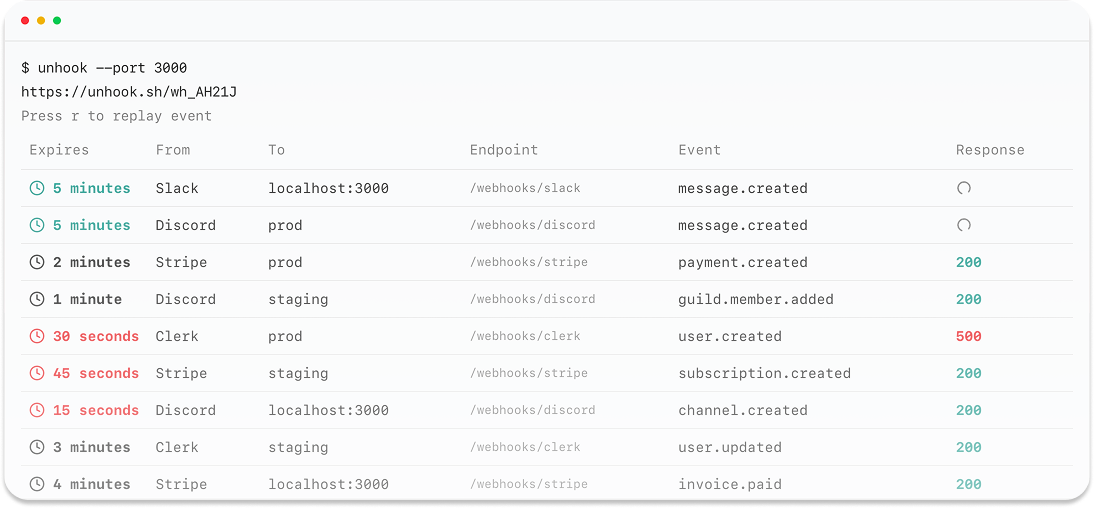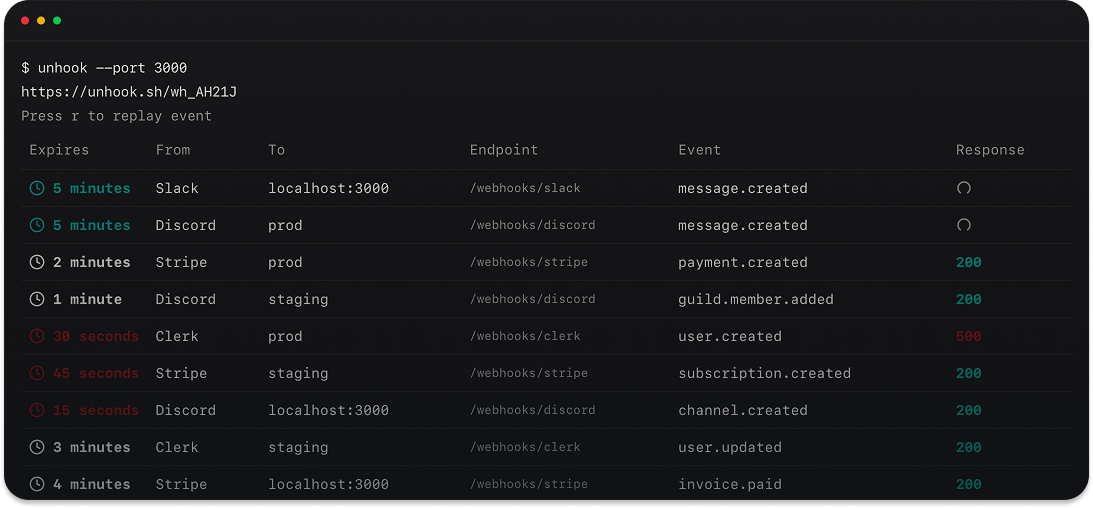

Overview
The Untrace Elixir SDK provides zero-latency LLM observability with automatic instrumentation for all major LLM providers. Built on OpenTelemetry standards, it captures comprehensive trace data and routes it to your chosen observability platforms.Quick Start
Start tracing LLM calls in minutes
Framework Support
Phoenix, LiveView, and OTP applications
OTP Integration
Built for Elixir’s actor model and supervision trees
Examples
Real-world examples and best practices
Installation
Adduntrace_sdk to your list of dependencies in mix.exs:
Copy
def deps do
[
{:untrace_sdk, "~> 0.1.2"}
]
end
Copy
mix deps.get
Quick Start
Basic Setup
Copy
# Initialize the client
{:ok, client} = Untrace.Client.start_link(api_key: "your-api-key")
# Send a trace event
{:ok, trace} = Untrace.Client.trace(client, %{
event_type: "llm_call",
data: %{
model: "gpt-4",
prompt: "Hello, world!",
response: "Hello! How can I help you today?",
tokens_used: 25
},
metadata: %{
user_id: "user123",
session_id: "session456"
}
})
IO.puts("Trace created: #{trace.id}")
# Stop the client
Untrace.Client.stop(client)
Synchronous Usage
Copy
# Initialize the client
{:ok, client} = Untrace.Client.start_link(api_key: "your-api-key")
# Send a trace event
{:ok, trace} = Untrace.Client.trace(client, %{
event_type: "llm_call",
data: %{
model: "gpt-4",
prompt: "Hello, world!",
response: "Hello! How can I help you today?"
}
})
IO.puts("Trace created: #{trace.id}")
# Stop the client
Untrace.Client.stop(client)
GenServer Usage
Copy
# Start as part of your supervision tree
children = [
{Untrace.Client, api_key: "your-api-key", name: :untrace_client}
]
Supervisor.start_link(children, strategy: :one_for_one)
# Use the named process
{:ok, trace} = Untrace.Client.trace(:untrace_client, %{
event_type: "llm_call",
data: %{model: "gpt-4", prompt: "Hello!"}
})
Configuration
Client Configuration
Copy
%{
api_key: "your-api-key", # Required
base_url: "https://untrace.dev/api", # Optional, defaults to https://untrace.dev/api
timeout: 30_000, # Optional, defaults to 30 seconds
name: :untrace_client # Optional, for named process
}
Environment Variables
The SDK supports configuration via environment variables:Copy
# Core settings
export UNTRACE_API_KEY="your-api-key"
export UNTRACE_BASE_URL="https://untrace.dev/api"
export UNTRACE_DEBUG="true"
# OpenTelemetry settings
export OTEL_SERVICE_NAME="my-service"
export OTEL_RESOURCE_ATTRIBUTES="environment=production,version=1.0.0"
Application Configuration
Copy
# config/config.exs
import Config
config :untrace_sdk,
api_key: System.get_env("UNTRACE_API_KEY"),
base_url: System.get_env("UNTRACE_BASE_URL", "https://untrace.dev/api"),
timeout: String.to_integer(System.get_env("UNTRACE_TIMEOUT", "30000")),
debug: System.get_env("UNTRACE_DEBUG") == "true"
Framework Integration
Phoenix Framework
Copy
# lib/my_app_web/controllers/chat_controller.ex
defmodule MyAppWeb.ChatController do
use MyAppWeb, :controller
def create(conn, %{"message" => message}) do
{:ok, trace} = Untrace.Client.trace(:untrace_client, %{
event_type: "llm_call",
data: %{
model: "gpt-4",
prompt: message,
response: "Generated response"
},
metadata: %{
user_id: get_session(conn, :user_id),
session_id: get_session(conn, :session_id)
}
})
json(conn, %{response: "Generated response", trace_id: trace.id})
end
end
Phoenix LiveView
Copy
defmodule MyAppWeb.ChatLive do
use MyAppWeb, :live_view
def handle_event("send_message", %{"message" => message}, socket) do
# Trace the user interaction
{:ok, trace} = Untrace.Client.trace(:untrace_client, %{
event_type: "user_interaction",
data: %{
action: "send_message",
message: message
},
metadata: %{
user_id: socket.assigns.current_user.id,
session_id: socket.id
}
})
# Process the message
response = process_message(message)
# Trace the LLM response
{:ok, llm_trace} = Untrace.Client.trace(:untrace_client, %{
event_type: "llm_call",
data: %{
model: "gpt-4",
prompt: message,
response: response
},
metadata: %{
parent_trace_id: trace.id,
user_id: socket.assigns.current_user.id
}
})
{:noreply, assign(socket, :messages, [%{message: message, response: response}])}
end
end
GenServer Integration
Copy
defmodule MyApp.LLMProcessor do
use GenServer
require Logger
def start_link(opts) do
GenServer.start_link(__MODULE__, opts, name: __MODULE__)
end
def process_message(message) do
GenServer.call(__MODULE__, {:process_message, message})
end
def init(opts) do
{:ok, %{untrace_client: opts[:untrace_client]}}
end
def handle_call({:process_message, message}, _from, state) do
# Start tracing
{:ok, trace} = Untrace.Client.trace(state.untrace_client, %{
event_type: "llm_processing",
data: %{message: message}
})
try do
# Process the message
response = call_llm_api(message)
# Update trace with response
Untrace.Client.update_trace(state.untrace_client, trace.id, %{
response: response,
status: "completed"
})
{:reply, {:ok, response}, state}
rescue
error ->
# Record error in trace
Untrace.Client.update_trace(state.untrace_client, trace.id, %{
error: Exception.message(error),
status: "failed"
})
Logger.error("Error processing message: #{Exception.message(error)}")
{:reply, {:error, error}, state}
end
end
end
Task Integration
Copy
defmodule MyApp.AsyncProcessor do
def process_async(messages) do
messages
|> Enum.map(&Task.async(fn -> process_message(&1) end))
|> Task.await_many()
end
defp process_message(message) do
{:ok, trace} = Untrace.Client.trace(:untrace_client, %{
event_type: "async_llm_call",
data: %{message: message}
})
try do
response = call_llm_api(message)
Untrace.Client.update_trace(:untrace_client, trace.id, %{
response: response,
status: "completed"
})
{:ok, response}
rescue
error ->
Untrace.Client.update_trace(:untrace_client, trace.id, %{
error: Exception.message(error),
status: "failed"
})
{:error, error}
end
end
end
Advanced Usage
Custom Trace Attributes
Copy
# Create a trace with custom attributes
{:ok, trace} = Untrace.Client.trace(:untrace_client, %{
event_type: "llm_call",
data: %{
model: "gpt-4",
prompt: "What is the meaning of life?",
response: "42",
tokens_used: 50,
temperature: 0.7,
max_tokens: 100
},
metadata: %{
user_id: "user123",
session_id: "session456",
timestamp: DateTime.utc_now() |> DateTime.to_iso8601(),
custom_metric: 42.5,
feature_flag: "new_ui"
}
})
Batch Tracing
Copy
# Send multiple traces in batch
traces = [
%{
event_type: "llm_call",
data: %{model: "gpt-4", prompt: "Hello 1"}
},
%{
event_type: "llm_call",
data: %{model: "gpt-4", prompt: "Hello 2"}
},
%{
event_type: "llm_call",
data: %{model: "gpt-4", prompt: "Hello 3"}
}
]
{:ok, results} = Untrace.Client.trace_batch(:untrace_client, traces)
IO.puts("Created #{length(results)} traces")
Error Handling
Copy
case Untrace.Client.trace(:untrace_client, trace_data) do
{:ok, trace} ->
IO.puts("Success: #{trace.id}")
{:error, :validation_error, message} ->
IO.puts("Validation error: #{message}")
{:error, :api_error, message} ->
IO.puts("API error: #{message}")
{:error, :network_error, reason} ->
IO.puts("Network error: #{inspect(reason)}")
end
Context Managers
Copy
defmodule MyApp.Tracing do
def with_trace(event_type, data, metadata \\ %{}, fun) do
{:ok, trace} = Untrace.Client.trace(:untrace_client, %{
event_type: event_type,
data: data,
metadata: metadata
})
try do
result = fun.()
Untrace.Client.update_trace(:untrace_client, trace.id, %{status: "completed"})
{:ok, result}
rescue
error ->
Untrace.Client.update_trace(:untrace_client, trace.id, %{
error: Exception.message(error),
status: "failed"
})
{:error, error}
end
end
end
# Usage
{:ok, result} = MyApp.Tracing.with_trace("llm_call", %{model: "gpt-4"}, %{}, fn ->
call_llm_api("Hello world")
end)
Telemetry Integration
The SDK emits telemetry events for monitoring:Copy
# Listen to trace events
:telemetry.attach(
"untrace-trace-sent",
[:untrace, :trace, :sent],
fn event, measurements, metadata, config ->
IO.inspect({event, measurements, metadata, config})
end,
nil
)
# Listen to errors
:telemetry.attach(
"untrace-error",
[:untrace, :error],
fn event, measurements, metadata, config ->
IO.inspect({event, measurements, metadata, config})
end,
nil
)
# Listen to batch events
:telemetry.attach(
"untrace-batch-sent",
[:untrace, :batch, :sent],
fn event, measurements, metadata, config ->
IO.inspect({event, measurements, metadata, config})
end,
nil
)
Custom Telemetry Handlers
Copy
defmodule MyApp.TelemetryHandlers do
require Logger
def handle_trace_sent(event, measurements, metadata, _config) do
Logger.info("Trace sent: #{metadata.trace_id}")
# Send to your monitoring system
send_to_monitoring(:trace_sent, measurements, metadata)
end
def handle_error(event, measurements, metadata, _config) do
Logger.error("Untrace error: #{metadata.error}")
# Send to your error tracking system
send_to_error_tracking(:untrace_error, measurements, metadata)
end
defp send_to_monitoring(event, measurements, metadata) do
# Your monitoring logic here
end
defp send_to_error_tracking(event, measurements, metadata) do
# Your error tracking logic here
end
end
# Attach handlers
:telemetry.attach_many(
"my-app-telemetry",
[
{[:untrace, :trace, :sent], &MyApp.TelemetryHandlers.handle_trace_sent/4},
{[:untrace, :error], &MyApp.TelemetryHandlers.handle_error/4}
],
nil
)
Examples
OpenAI Integration
Copy
defmodule MyApp.OpenAIService do
require Logger
def chat(prompt) do
{:ok, trace} = Untrace.Client.trace(:untrace_client, %{
event_type: "llm_call",
data: %{
model: "gpt-4",
prompt: prompt
}
})
try do
# Make OpenAI API call (pseudo-code)
response = call_openai_api(prompt)
# Update trace with response
Untrace.Client.update_trace(:untrace_client, trace.id, %{
response: response,
tokens_used: 100,
finish_reason: "stop"
})
{:ok, response}
rescue
error ->
# Record error in trace
Untrace.Client.update_trace(:untrace_client, trace.id, %{
error: Exception.message(error),
error_type: error.__struct__.__name__
})
Logger.error("OpenAI API error: #{Exception.message(error)}")
{:error, error}
end
end
defp call_openai_api(prompt) do
# Your OpenAI API call implementation
"Generated response for: #{prompt}"
end
end
Batch Processing
Copy
defmodule MyApp.BatchProcessor do
def process_prompts(prompts) do
prompts
|> Enum.with_index()
|> Enum.map(fn {prompt, index} ->
Task.async(fn -> process_prompt(prompt, index) end)
end)
|> Task.await_many()
end
defp process_prompt(prompt, index) do
{:ok, trace} = Untrace.Client.trace(:untrace_client, %{
event_type: "batch_processing",
data: %{
model: "gpt-4",
prompt: prompt,
batch_index: index
}
})
try do
response = call_llm_api(prompt)
Untrace.Client.update_trace(:untrace_client, trace.id, %{
response: response,
status: "completed"
})
{:ok, response}
rescue
error ->
Untrace.Client.update_trace(:untrace_client, trace.id, %{
error: Exception.message(error),
status: "failed"
})
{:error, error}
end
end
end
Stream Processing
Copy
defmodule MyApp.StreamProcessor do
def process_stream(stream) do
stream
|> Stream.map(&process_item/1)
|> Stream.run()
end
defp process_item(item) do
{:ok, trace} = Untrace.Client.trace(:untrace_client, %{
event_type: "stream_processing",
data: %{item: item}
})
try do
result = process_item_logic(item)
Untrace.Client.update_trace(:untrace_client, trace.id, %{
result: result,
status: "completed"
})
result
rescue
error ->
Untrace.Client.update_trace(:untrace_client, trace.id, %{
error: Exception.message(error),
status: "failed"
})
raise error
end
end
defp process_item_logic(item) do
# Your processing logic here
"Processed: #{item}"
end
end
OTP Integration
Supervision Tree
Copy
defmodule MyApp.Application do
use Application
def start(_type, _args) do
children = [
# Start Untrace client
{Untrace.Client, api_key: System.get_env("UNTRACE_API_KEY"), name: :untrace_client},
# Your other children
MyApp.LLMProcessor,
MyApp.BatchProcessor
]
Supervisor.start_link(children, strategy: :one_for_one)
end
end
Dynamic Supervision
Copy
defmodule MyApp.DynamicProcessor do
use DynamicSupervisor
def start_link(init_arg) do
DynamicSupervisor.start_link(__MODULE__, init_arg, name: __MODULE__)
end
def init(_init_arg) do
DynamicSupervisor.init(strategy: :one_for_one)
end
def start_processor(prompt) do
child_spec = %{
id: make_ref(),
start: {MyApp.Processor, :start_link, [prompt]},
restart: :temporary
}
DynamicSupervisor.start_child(__MODULE__, child_spec)
end
end
defmodule MyApp.Processor do
use GenServer
def start_link(prompt) do
GenServer.start_link(__MODULE__, prompt)
end
def init(prompt) do
{:ok, trace} = Untrace.Client.trace(:untrace_client, %{
event_type: "dynamic_processing",
data: %{prompt: prompt}
})
# Process the prompt
send(self(), :process)
{:ok, %{prompt: prompt, trace: trace}}
end
def handle_info(:process, state) do
# Process the prompt
result = call_llm_api(state.prompt)
Untrace.Client.update_trace(:untrace_client, state.trace.id, %{
result: result,
status: "completed"
})
{:stop, :normal, state}
end
end
Best Practices
1. Use Named Processes
Copy
# Good: Use named processes for easy access
{:ok, _pid} = Untrace.Client.start_link(api_key: "your-api-key", name: :untrace_client)
Untrace.Client.trace(:untrace_client, trace_data)
# Avoid: Managing PIDs manually
{:ok, pid} = Untrace.Client.start_link(api_key: "your-api-key")
Untrace.Client.trace(pid, trace_data)
2. Handle Errors Gracefully
Copy
def safe_trace(event_type, data, metadata \\ %{}) do
case Untrace.Client.trace(:untrace_client, %{
event_type: event_type,
data: data,
metadata: metadata
}) do
{:ok, trace} -> {:ok, trace}
{:error, reason, message} ->
Logger.error("Trace failed: #{reason} - #{message}")
{:error, {reason, message}}
end
end
3. Use Context Managers
Copy
defmodule MyApp.Tracing do
def with_trace(event_type, data, metadata \\ %{}, fun) do
{:ok, trace} = Untrace.Client.trace(:untrace_client, %{
event_type: event_type,
data: data,
metadata: metadata
})
try do
result = fun.()
Untrace.Client.update_trace(:untrace_client, trace.id, %{status: "completed"})
{:ok, result}
rescue
error ->
Untrace.Client.update_trace(:untrace_client, trace.id, %{
error: Exception.message(error),
status: "failed"
})
{:error, error}
end
end
end
4. Initialize in Application
Copy
# Good: Initialize in application supervision tree
defmodule MyApp.Application do
use Application
def start(_type, _args) do
children = [
{Untrace.Client, api_key: System.get_env("UNTRACE_API_KEY"), name: :untrace_client},
# ... other children
]
Supervisor.start_link(children, strategy: :one_for_one)
end
end
Troubleshooting
Common Issues
No traces appearing
No traces appearing
Copy
# Enable debug mode
{:ok, client} = Untrace.Client.start_link(
api_key: "your-api-key",
debug: true
)
# Check logs for errors
Connection timeouts
Connection timeouts
Copy
# Increase timeout
{:ok, client} = Untrace.Client.start_link(
api_key: "your-api-key",
timeout: 60_000
)
Process crashes
Process crashes
Copy
# Use supervision tree for automatic restart
children = [
{Untrace.Client, api_key: "your-api-key", name: :untrace_client}
]
Supervisor.start_link(children, strategy: :one_for_one)
Memory usage
Memory usage
Copy
# Use batch processing for high volume
Untrace.Client.trace_batch(:untrace_client, traces)
API Reference
Untrace.Client
The main client module for interacting with the Untrace API.Functions
start_link/1: Start a new client processtrace/2: Send a trace eventtrace_batch/2: Send multiple traces in batchupdate_trace/3: Update an existing traceget_trace/2: Retrieve a trace by IDstop/1: Stop the client process
Configuration
Copy
%{
api_key: "your-api-key", # Required
base_url: "https://untrace.dev/api", # Optional, defaults to https://untrace.dev/api
timeout: 30_000, # Optional, defaults to 30 seconds
name: :untrace_client # Optional, for named process
}
Error Types
{:error, :validation_error, message}: Raised when request validation fails{:error, :api_error, message}: Raised when API requests fail{:error, :network_error, reason}: Raised when network requests fail
Support
- Documentation: https://docs.untrace.dev
- GitHub Issues: https://github.com/untrace-dev/untrace/issues
- Discord Community: Join our Discord
- Email Support: support@untrace.dev